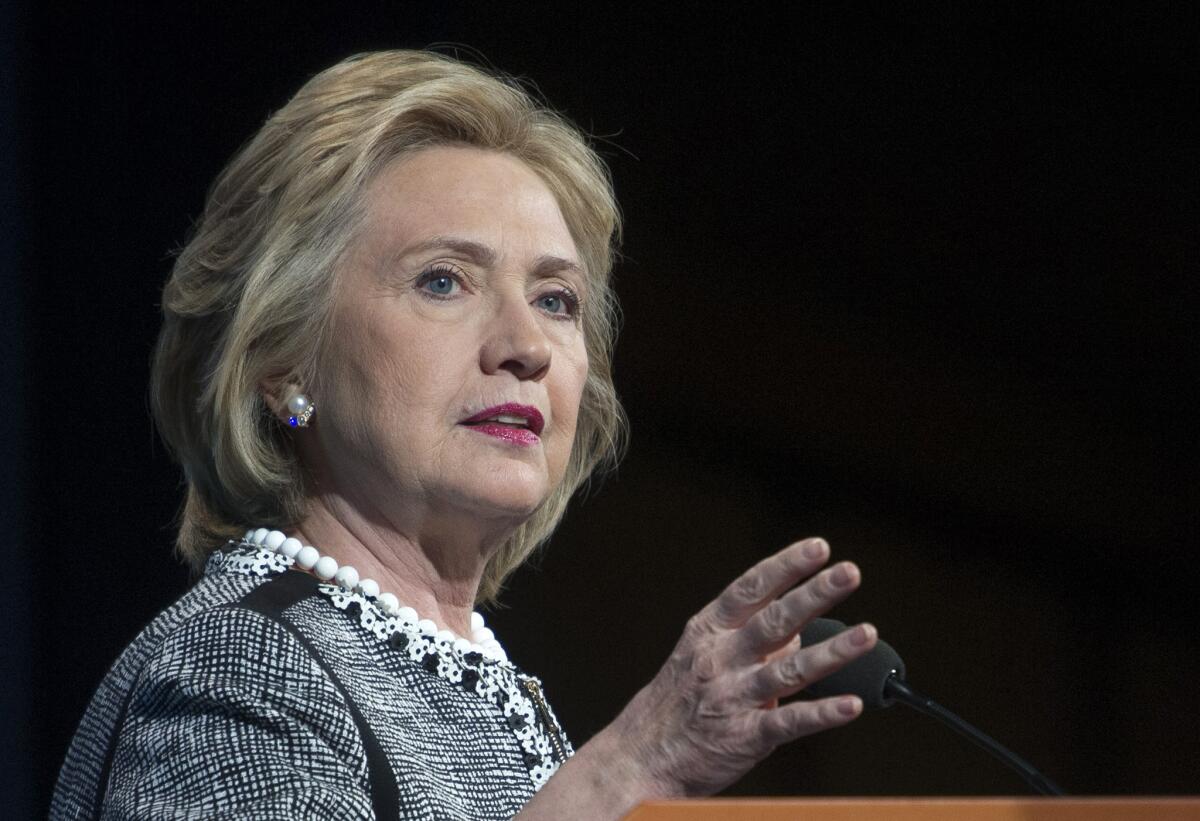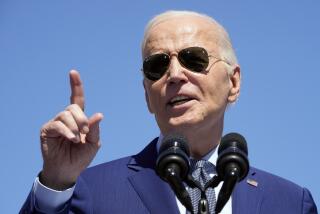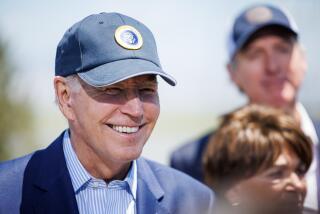Analysis: Hillary Rodham Clinton borrows Reagan tactic on voter wish for ‘change’

As Hillary Rodham Clinton continues to build toward a widely anticipated presidential campaign, a speech she gave Friday illustrates how she might attempt to overcome one of the hurdles she faces: voters’ typical desire for change.
For either U.S. political party, winning three presidential elections in a row is a difficult challenge, although certainly possible. Polls already have shown signs of voter fatigue with the battles of the Obama years, which could pose problems for any Democrat running in 2016.
The last time a party succeeded in winning three in a row, Ronald Reagan was the incumbent. Clinton’s speech to the New America Foundation, a Washington-based think tank, borrowed a tactic the Republican champion memorably used to great effect that year.
“Now we hear talk that it’s time for a change,” Reagan declared in his speech at the 1988 Republican convention. “Well, ladies and gentlemen, another friendly reminder: We are the change.” Republicans had “challenged the failed policies of the past,” Reagan said, “and that was our change.”
Clinton, not yet a declared candidate, avoided anything quite so openly political. But her speech skimmed rapidly past the current presidency, focusing greater attention on the Democrats’ version of the “failed policies of the past.”
As she did so, the former secretary of State sought to align herself not just with the frustration many voters now feel over the economy but also with the focus on economic inequality that has emerged as a major theme for the liberal wing of the Democratic Party.
“The dream of upward mobility that made this country a model for the world feels further and further out of reach, and many Americans understandably feel frustrated, even angry,” she said.
Those economic problems pre-dated Obama, she implied. “Since 2000, productivity has increased by more than 25%, yet wages for most Americans have stagnated, further depressing demand and slowing growth.”
“Americans are working harder, contributing more than ever to their companies’ bottom lines and to our country’s total economic output, and yet many are still barely getting by, barely holding on, not seeing the rewards that they believe their hard work should have merited,” she added.
“And where’s it all going? Well, economists have documented how the share of income and wealth going to those at the very top, not just the top 1% but the top .1% or the .01% of the population, has risen sharply over the last generation. Some are calling it a throwback to the Gilded Age of the robber barons.”
Having described the problem as one that has persisted “since 2000” or “over the last generation,” Clinton pointed to an even earlier era – her husband’s presidency – as a potential source for solutions.
“The 1990s taught us that even in the face of difficult long-term economic trends, it’s possible, through smart policies and sound investments, to enjoy broad-based growth and shared prosperity,” she said.
Bill Clinton recently gave a speech at Georgetown University where he defended his economic record. Hillary Clinton referred to that speech and echoed some of the former president’s favorite economic descriptions.
“A rising tide really did lift all boats: 23 million new jobs were created,” she said, “raising the minimum wage, doubling the earned income tax credit -- that helped millions of lower-income families climb out of poverty for the first time -- the Children’s Health Insurance Program changed millions of young lives, and on and on -- all with a balanced budget that resulted in surpluses as far as the eye could see.”
By contrast, she said, the Bush years “taught us different lessons about how, by policy choices, we can turn surpluses into debt, we can return to rising deficits.”
“Regulators neglected their oversight of the financial sector and allowed the evolution of an entire shadow banking system that operated without accountability. Government failed to invest adequately in infrastructure, education, basic research, and then the housing crash, the financial crisis hit like a flash flood. Millions of jobs washed away, along with college savings, mortgages, nest eggs for retirement, confidence -- that intangible -- confidence in the future.”
With all those problems, “it’s taken years of painstaking work and strong leadership from President Obama to get our economy growing again,” she said, offering her only passing reference to the current incumbent.
To keep that economic growth going, Clinton continued, America needs to “learn again how to work together, how to compromise, how to make pragmatic decisions.”
Running against George W. Bush has some downsides as a strategy. Republicans already have laid the groundwork for declaring Clinton a candidate of the past, not the future.
But polls show many Americans continue to blame Bush for a large part of the country’s economic problems. And with many prominent Republicans urging the former president’s brother Jeb Bush to run, Clinton’s speech could be a harbinger of many to come.
More to Read
Start your day right
Sign up for Essential California for news, features and recommendations from the L.A. Times and beyond in your inbox six days a week.
You may occasionally receive promotional content from the Los Angeles Times.







